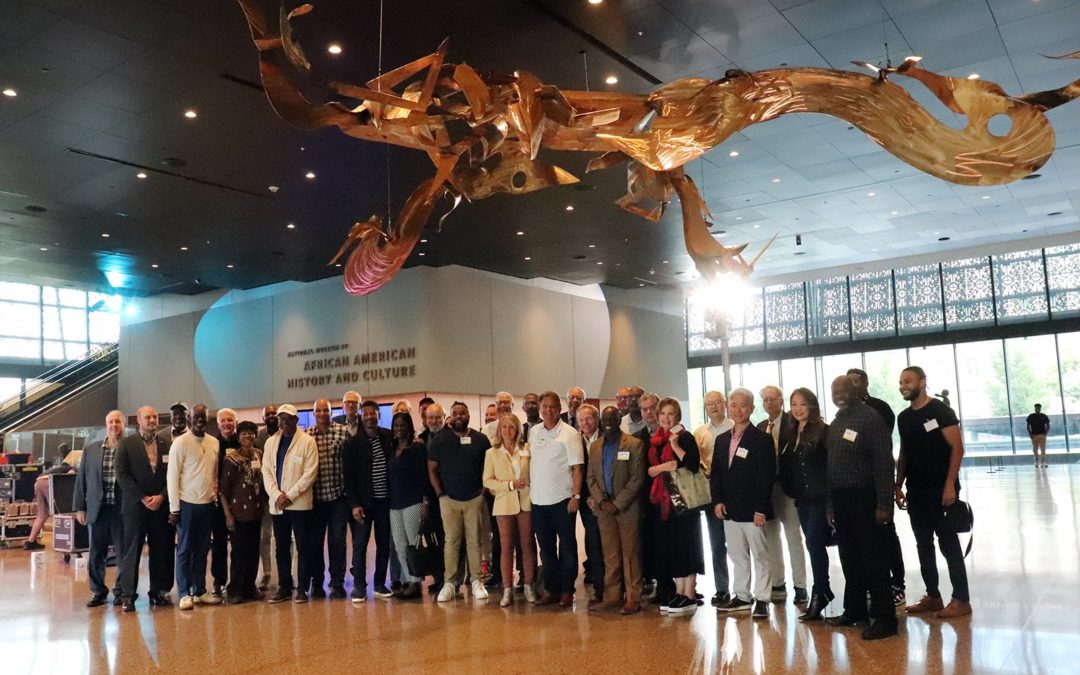
by Adelle M. Banks, RNS | Sep 26, 2022 | Headline News, Social Justice |
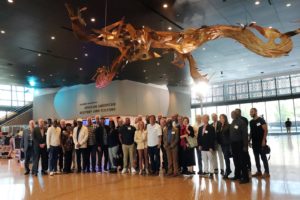
Visitors with a Let’s Talk initiative pose together at the National Museum of African American History and Culture, Sept. 13, 2022, in Washington. RNS photo by Adelle M. Banks
WASHINGTON (RNS) — For missionary Doug Gentile, it was seeing the “shackles for tiny children” used during American slavery.
For seminary professor Darrell Bock, it was confronting the specificity of the list of “Black codes” that restricted the lives of Black people after slavery ended — mandates in many states, for instance, that they sign annual labor contracts on pain of arrest.
These revelations, and many more, came out of an early morning tour Tuesday (Sept. 13) of an otherwise empty National Museum of African American History and Culture for 42 Black, white and Asian American evangelical Christian leaders, sponsored by an initiative called Let’s Talk, which aims to foster racial unity among evangelicals.
“A lot of folks had some real eye-opening moments at the museum,” said Bishop Derek Grier, founder of Let’s Talk, the day after the tour.
The visitors, who included Council for Christian Colleges & Universities President Shirley V. Hoogstra, public relations executive and longtime Billy Graham spokesman A. Larry Ross and National Association of Evangelicals President Walter Kim, followed a museum guide, most listening silently, past Harriet Tubman’s hymnal, a dress made by Rosa Parks at the time of her bus protest and an exhibit about the bombing of Birmingham’s 16th Street Baptist Church, which occurred 59 years nearly to the day before the tour.
Their guide explained that enslaved Blacks regularly attended “what could be called church” secretly in brush arbors, because it was illegal for them to preach or gather during the time of slavery.
But there were other lessons about how the slave experience formed the basis of what some view as racial injustices today. “Most people did not realize the economic impact slavery had on the founding of the United States of America and one of the plaques said something along the lines of 60% of the U.S. economy was based on slavery,” said Grier, who is Black.
The initiative comes in answer to the rejection by some evangelicals of the idea of systemic racism. A 2019 survey found that, when asked if the country has historically been oppressive for racial minorities, 82% of white evangelicals did not agree.
Gentile, founder of Alexandria, Virginia, nonprofit James 2 Association, said the tour bolstered his organization’s goal “to use the Bible to fight back against these white-rage, rear-guard attempts to cancel discussions of racial history and racial justice in the public schools.”
Pastor Lee Jenkins, the leader of the nondenominational Eagles Nest Church in Roswell, Georgia, and co-chair of the regional organization One Race, said he appreciated how some white visitors to the museum were affected by what they saw.
“It shook some of them to their core,” he said. “And that was encouraging because it showed that they had compassion and they were willing to acknowledge that America has had a problem in this area and this problem of racism and injustice needs to be addressed.”
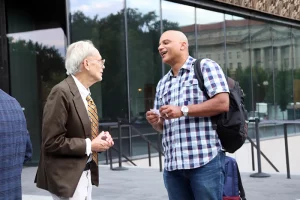
Bishop Derek Grier, right, founder of Let’s Talk, talks with missionary Doug Gentile outside the National Museum of African American History and Culture, Sept. 13, 2022, in Washington. RNS photo by Adelle M. Banks
The Let’s Talk initiative was launched at a banquet at the Museum of the Bible in November, and since then more than 500 people have signed its “Statement of Change,” which says in part: “We believe both the spirit and clear moral imperatives of scripture require the Christian community to lead the way in defeating racial bigotry.”
Some of the signers have also committed to meeting regularly — at first monthly and now quarterly — over Zoom to continue conversations about racial tensions.
Many of the participants already work on race issues through their churches or organizations. But Kim said Let’s Talk was a chance to learn, share and network together. “There’s a desire for us not to be territorial about this work,” he said. “This is gospel work, and it is really important for us to be in collaboration with others, sometimes applauding what they’re doing from afar, other times collaborating closely.”
Bock, a white New Testament scholar who has taught at Dallas Theological Seminary for 41 years, said the museum tour helped orient the work the group has ahead. He said their focus on unity in Christ is a starting point for conversations about polarization in the country, adding that discussions of race should not be separated from the church’s testimony.
“Most of the evangelical church is about individual salvation and a person’s individual walk with God,” he said. “This is all about larger community structures and being able to think through that space and to help people see that space is an important part of the conversation.”
Kim said his organization expects to support Grier’s plans for a “Unity Weekend” in June 2023, when churches will cooperate across racial and denominational lines on service projects and hear sermons about unity.
In March, the NAE hired a director of its new Racial Justice & Reconciliation Collaborative who has been meeting with leaders of local and regional initiatives to address racial injustice such as One Race. The NAE, an umbrella organization for a wide range of evangelical organizations, hopes to foster networks that address not only what the churches can do within their own structures but beyond them to transform their communities.
Grier, who is pastor of an independent church in Dumfries, Virginia, said his reasons for founding Let’s Talk are based on biblical lessons about collaboration, including Jesus’ teaching in the Gospels “that they may be one” and that “a house divided against itself will not stand.”
“I have children I love, people I love that are going to be here a lot longer than I will be,” said the 57-year-old pastor. “And I want to make sure that I do my part in trying to make this a better country for the young people that are going to follow us.”
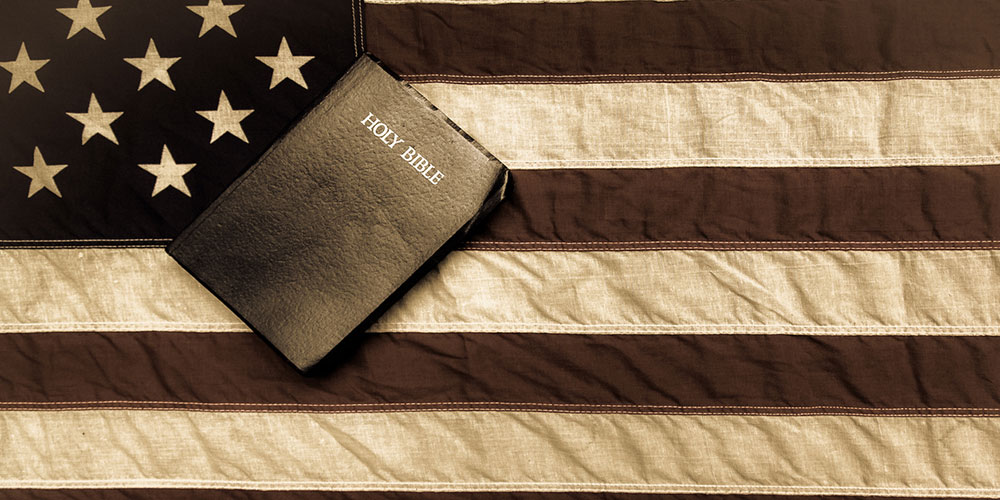
by Shane Claiborne and Don Golden, RNS | Sep 3, 2018 | Headline News, Social Justice |

There’s a story in the Old Testament about the king of Babylon, Belshazzar, who hosted a dinner for his religious leaders and royal elites. The blindingly arrogant king, surrounded by adoring sycophants, hauled out the holy articles stolen from the temple in Jerusalem to swank up his party.
The lesson of Belshazzar is that co-opting the things of God for the purpose of arrogant power is dangerous business. God showed up in a puzzling display of divine judgment — a great hand appeared and began to write on the wall.
On Monday night (August 27), the White House hosted something like a state dinner to honor the leadership of American evangelicals. Many cabinet members were present, along with the president, the first lady and dozens of members of the group of informal evangelical advisers who enjoy unique access to President Trump.
It’s the latest puzzling contradiction raised by evangelicals working in the service of a president whose character and so many of his policies stand in direct contradiction to the words of Jesus.
As evangelicals not invited to the party — and not likely to be anytime soon — we are astonished that none of these leaders seem to have brought before the president and his cabinet the justice issues so pressing in our day.
Speaking to David Brody on the Christian Broadcasting Network prior to the dinner, Robert Jeffress, senior pastor of First Baptist Dallas, declared the real reason for the event, saying the White House is “cognizant of the fact that the midterms are coming up. And they’re facing the possibility of a Democrat Congress that, if they take control of the legislature, are going to either impeach this president from office or at least paralyze him while he’s in office. … He knows he’s got to have his evangelical base behind him.”

Pastor Robert Jeffress introduces President Trump during the Celebrate Freedom event at the Kennedy Center for the Performing Arts in Washington, on July 1, 2017. (AP Photo/Carolyn Kaster)
Pastor Robert Jeffress introduces President Trump during the Celebrate Freedom event at the Kennedy Center for the Performing Arts in Washington, on July 1, 2017. (AP Photo/Carolyn Kaster)
Jeffress isn’t even hiding the partisan political role he is actively playing. Instead of showing up on God’s terms he’s all about the midterms!
What is the cost of this wholesale evangelical sellout? Among other concerns is the plight of persecuted Christians and other religious minorities around the world, who have been all but abandoned by the president’s near shutdown of the long-standing U.S. refugee resettlement program.
The numbers are stark. Over the past decade, according to the State Department’s Refugee Processing Center, the U.S. welcomed more than 280,000 persecuted Christians to enjoy religious freedom and rebuild their lives. Some 42,000 Christians found refuge here in 2016 alone.
RELATED: White House honors evangelicals ‘for all the good work they do’
Since coming into office, the Trump administration has dramatically slashed the number of refugees entering the U.S. through a combination of executive orders, historically low ceilings on refugee admissions and intentional slowdowns of processing overseas.
Christians have been harmed alongside Muslims and others. With just one month left in the current fiscal year, the U.S. is on track to receive fewer than 14,700 Christian refugees and fewer than 22,000 total.
Many of those admitted in recent years have been persecuted particularly for their Christian faith, fleeing brutal governments that have no respect for religious liberty in countries such as Myanmar, Iran and North Korea and terrorist groups like the so-called Islamic State and al-Qaida in Iraq and Syria. Were these fellow Christians mentioned at the White House?
Resettlement of persecuted Christians from Iran and Iraq – which together accounted for about 60,000 Christian refugees over the past decade – are down by roughly 99 percent: Just 46 Christian refugees have been allowed to arrive this fiscal year from these two countries, among those where advocacy group Open Doors says that Christians face the “most extreme” persecution in the world.
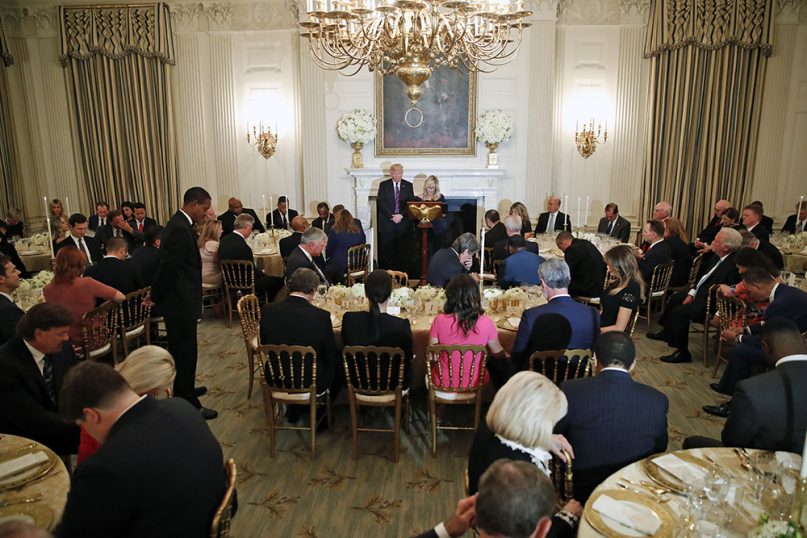
President Trump bows his head as pastor Paula White leads the room in prayer during a dinner for evangelical leaders in the State Dining Room of the White House on Aug. 27, 2018, in Washington. (AP Photo/Alex Brandon)
Other religious minorities have been kept out as well: just one Jewish refugee has been allowed in from Iran (compared to more than 70 in 2016), and only five Yazidis from Iraq (compared to hundreds in 2016). Any mention of these needy people of faith Monday night?
We’re not only concerned about the plight of Christians or other religious minorities: We’re equally troubled by the decline in resettlement of Muslim refugees, whose arrival numbers are down to fewer than 3,000 thus far this fiscal year, on track for a decline of more than 90 percent compared to two years ago. As Christians, we believe that Muslims are among the “neighbors” whom Jesus explicitly commands his followers to love.
After all, when Jesus responded to the clarifying question “who is my neighbor?” he told the story of a man — the Good Samaritan — who provided help to someone of a different religious tradition who was in desperate need. Where was the advocacy for our Muslim friends?
To be honest, we’re not surprised that most of the president’s evangelical supporters are not lobbying on behalf of Muslim refugees. Some of them were calling for a Muslim ban before Donald Trump did. Fully three-quarters of white evangelicals supported the president’s initial executive order barring refugees and Muslims from entering the country.
But we had hoped that the White House’s guests would show concern about the plight of fellow Christians, as even the president seemed to be as he entered office: In an interview recorded the day he signed his first executive order barring refugees Trump said he would be doing more to help persecuted Christians fleeing Syria. “We are going to help them,” the president pledged in a CBN interview. “They’ve been horribly treated. Do you know if you were a Christian in Syria it was impossible, at least very tough to get into the United States?”
It’s true that the share of Syrian refugees admitted to the U.S. in fiscal 2016 was small, but at least 120 Syrian Christians were admitted that year. In the past eight months, only nine Syrian Christian refugees have been able to come to the U.S., on track for an annual decline of about 90 percent. Were the traumas of Syria spoken of on Monday evening?
There are evangelical Christians concerned about this dynamic. A letter released earlier this month by the leaders of several influential evangelical organizations, including the National Association of Evangelicals, the Southern Baptist Ethics and Religious Liberty Commission, World Relief, and the National Hispanic Christian Leadership Conference, urged the administration to consider an annual ceiling of at least 75,000 refugees for the upcoming year, consistent with historical norms. We were proud to add our names to the letter.
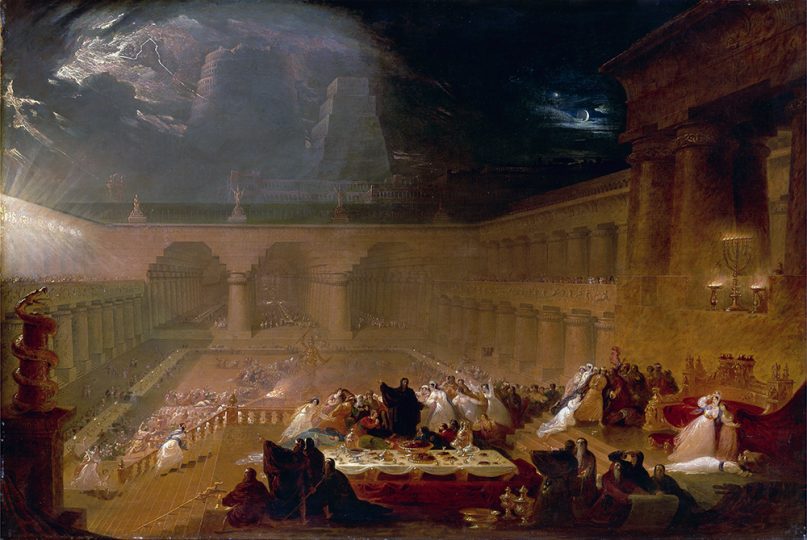
“Belshazzar’s Feast” by John Martin circa 1821. Image courtesy Creative Commons
We wonder if the invited evangelical “advisers,” while mingling with the president and his cabinet, considered these numbers worth mentioning. We genuinely hoped that these leaders would advocate for them behind the scenes, even if few have spoken publicly. Did they take these concerns to the president in secret?
If Trump further reduces the refugee numbers next month as expected, we’ll know the true price of a White House dinner.
At the end of the biblical story, Daniel, the faithful servant of God, was summoned to decipher the writing on the wall:
Oh King, your days are numbered
You’ve been weighed and found wanting
Your kingdom will be divided and given to your enemies
If we take the lessons of the biblical prophet Daniel seriously, what came true for King Belshazzar threatens this president too.
(Shane Claiborne is founder of The Simple Way in Philadelphia, and co-founder of Red Letter Christians. Don Golden is executive director of Red Letter Christians and a former executive at World Vision and World Relief. The views expressed in this commentary do not necessarily represent those of Religion News Service.)







